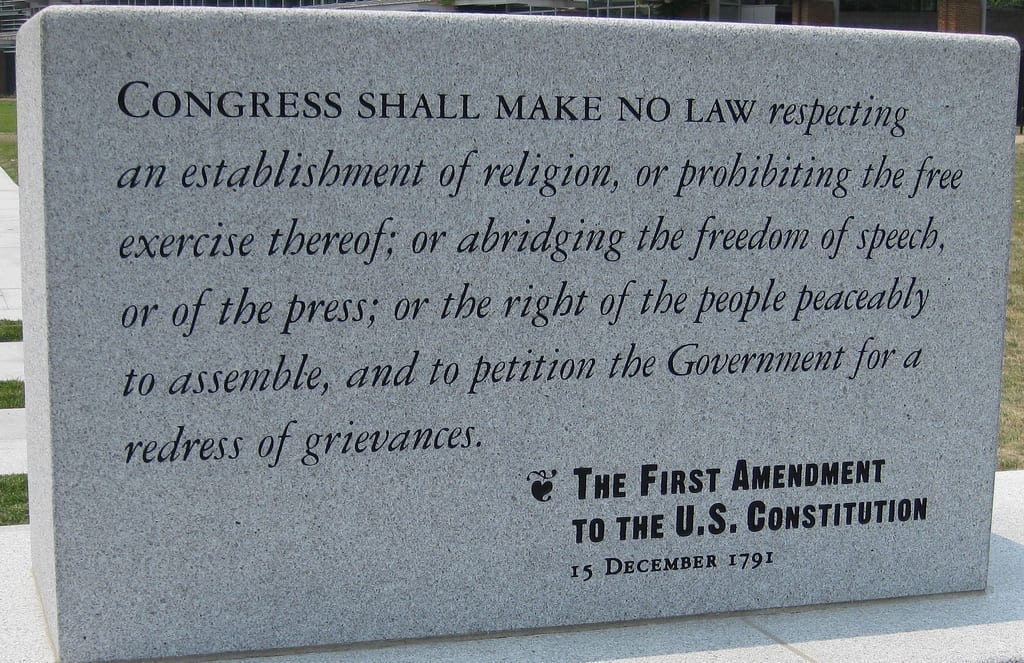There have been a number of First Amendment issues in the news recently. Some are rehashes of the same old battles, and others give us more to chew on.
There have been a number of First Amendment issues in the news recently. Some are rehashes of the same old battles, and others give us more to chew on.
Remember that one about the Christian baker and the gay wedding cake? Yep, that’s one of the First Amendment issues coming around again. This fall, newly topped up with conservative darling Neil Gorsuch, the Supreme Court will hear an appeal of the Colorado case. Masterpiece Cake Shop v. Colorado Civil Rights Commission concerns Colorado baker Jack Phillips, who refused to bake a cake for the wedding reception being held by David Mullins and Charlie Craig. Mullins and Craig were legally married in Massachusetts in 2012.
Phillips claims that baking the cake would violate his free exercise of religion and would also constitute coerced speech. Lower courts have consistently held that baking a cake would do neither of these, but is considered to be illegal discrimination due to the couple’s sexual orientation. This last bit is of key importance when only 22 states have anti-discrimination laws that extend protection to gay people. On one hand, the cake fight is bigger than it first appears: it’s a proxy in the culture war, and will have an outsized impact on the way some civil rights issues are decided in the future. On the other hand, if baking a cake means that the baker is actually endorsing or taking part in a same-sex union, perhaps gun shop owners will one day be considered to have participated in any crimes committed with the guns they sold. Hey, it’s possible, right?

Next in the series of First Amendment issues is the Trinity Lutheran v. Comer decision. The Supremes came down on the side of Trinity Lutheran, the church whose ministry involved running a daycare and playground for children. Amazingly, seven of nine justices agreed (for differing reasons) that public funds could not be denied to a church simply because it has a religious mission. Although some majority-opinion justices used language meant to limit the scope of their decision, the idea that governments must provide resources directly to a religious organization has implications for many future policy fights sure to arise, including funding of faith-based education. However, if funds provided to beef up a church playground are not considered fungible in the context of the Establishment clause, perhaps similarly non-fungible funds can be provided for Planned Parenthood’s public health mission, free from any involvement with the Hyde Amendment.
It’s not just the Supreme Court ruling on recent First Amendment issues. A Montana state court recently decided that the USDA’s checkoff program constituted a form of coerced speech, paid for by the state’s independent cattle ranchers. Checkoff programs are tiny, mandatory taxes paid by producers of certain agricultural commodities. These funds go towards marketing efforts that supposedly benefit the producers of that commodity. This is where ad campaigns like “Got Milk?” or “Beef: It’s What’s For Dinner” come from. In this case, the Montana Beef Council used checkoff money to partially fund a commercial claiming that Wendy’s fast food hamburgers are made using North American beef. American ranchers rankled at having to pay to promote Canadian and Mexican beef exports. As a result, the ranchers must still pay the dollar-per-head checkoff, but non-governmental organizations will only receive a portion of the proceeds from ranchers who opt in.
One of the First Amendment issues before Congress is whether or not churches should be able to back political candidates while also retaining their tax-exempt status. House Republicans amended a spending bill to de-fund IRS efforts at enforcing the Johnson Amendment, originally signed into law by Dwight Eisenhower in 1954. While priests and pastors have always been free, as private citizens, to endorse any political position they like, this would potentially turn the pulpit itself into your Facebook feed, minus the cat pictures. Interestingly, non-Christian houses of worship, such as mosques and synagogues, don’t seem to be included in the conservative liberalization effort.
Finally, lest we mistake First Amendment issues as being about the rights of all Americans to express their sincerely held beliefs, we get to those whose free speech matters most: the wealthy. Since the landmark Citizens United decision in 2010, money has been even more equated with speech than ever before. Those with wallets full of “words” wasted no time making sure that their “shouting” could be heard over those who could afford only humble whispers. In this case, our loudest citizens are insisting that an agenda that benefits them at the cost of most of the rest of us be passed post haste, or the checkbooks would close and perhaps the Republicans would lose their majority in Congress in the next election. One can only hope.
Related: Fungibility Key in Trinity Lutheran Case


Join the conversation!